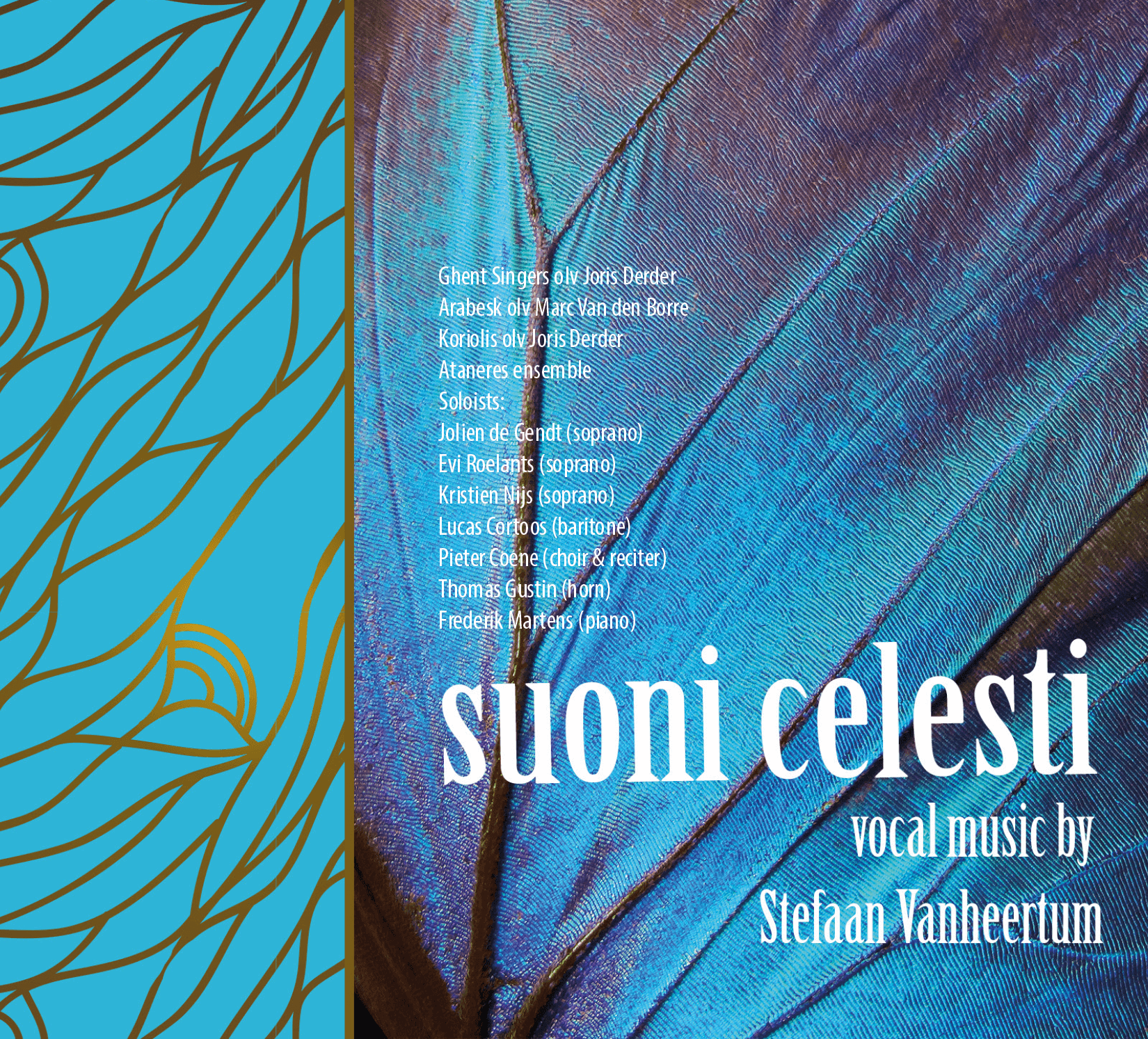Souni Celesti
Year of release: 2023
Track infoThis professionally recorded CD contains music for mixed and women’s choir, a capella, some with piano accompaniment, some with soloists or strings.
Some selected explanation and background information on the compositions:
- Three works based on the Christian religion: "Lux Aeterna" (a capella version and one with string accompaniment), where the mystery of eternal life is evoked but also questioned. "O Magnum Mysterium" about the mystery of new life. And an "Agnus Dei", seen as a prayer for peace, a difficult theme for humanity.
- "4 Haiku's" (about the 4 seasons) written by Herman Van Rompuy, and set for a capella women's choir or soloists. Short pieces... obviously!
- "Er was eens water" after a poem by the Flemish poet Peter Verhelst, written in response to the shocking photo (2015) of a little boy (Alan Kurdi) who drowned during a crossing of the Mediterranean Sea.
- The song "Mother Earth" is based on a poem by New Zealand writer Nadine Anne Hura. She wrote this poem on the day the world went into lockdown in March 2020. At the same time, she links this to the climate crisis. This poem was intensively shared on Facebook in 2020. For women’s choir and two soloists.
- A song on a text by Edgar Allan Poe: "Spirits of the dead". A text that has a personal meaning to the conductor, Joris Derder.
- “Hope is a thing with feathers”: written during lockdown in the summer of 2020 and can be performed in corona proof fashion.....
- The Voice: an anti-war poem written in the Ypres trenches in the First World War by Alfred Mills. Mixed choir with soprano solo.
- Rilke's poetry is always very grateful to set to music. The poem ‘Ich lebe mein Leben in wachsenden Ringen’ (mixed choir a capella) and the three poems on three animals in the Parisian zoo (women’s choir accompanied by horn) were used for compositions.
Performers:
Ghent Singers conducted by Joris Derder
Arabesk conducted by Marc Van den Borre
Koriolis conducted by Joris Derder
Ataneres ensemble
Soloists:
Jolien de Gendt (soprano)
Evi Roelants (soprano)
Kristien Nijs (soprano)
Lucas Cortoos (baritone)
Pieter Coene (choir & reciter)
Thomas Gustin (horn)
Frederik Martens (piano)
You can find further information about all performers on the world wide web.
This cd can be ordered for €12 (exclusive shipment costs, if applicable) via the contact tab on this website or via my email address (stefaan.vanheertum@telenet.be) or through facebook. Once you send us your order, we will ship the requested cd to your address and provide payment details via email (payment via secured bankaccount transfer).
On March 3 2023, Wynold Verweij - a reviewer of contemporary classical music for the web-based klassiek-centraal- wrote the following about the CD:
Ghent composer Stefaan Vanheertum has just released his new CD Suoni Celesti. The CD contains choral works he wrote between 2014 and 2021. The collection is the result of a concert that took place September 2022.
Suoni Celesti (heavenly sounds) consists of religious and liturgical works and pieces based on poems by Rainer Maria Rilke, Peter Verhelst, Nadine Anne Hura, Edgar Allen Poe and Emily Dickinson. Also included are four short pieces on haikus by Herman Van Rompuy. Performers are the Ghent Singers, Ateneres, Koriolis and Arabesk.
Er was eens water (Once upon a time, there was water) is inspired by a poem by Flemish poet Peter Verhelst, written in response to the drowning of a young refugee in the Mediterranean in 2015. The result is a sombre musical tale in which the ending words “As loud as we could, we tried to keep thinking there once was, there once was” are respectfully laid down. Pieter Coene, who reads the poem, demonstrates the poignancy of the Dutch language as a recitation art.Mother Earth, based on a poem by New Zealand’s Nadine Anne Hura, and Spirits of the dead, a song to a text by Edgar Allan Poe, depict finitude (corona and climate crisis) and death.
The CD’s pièce de résistance is The Voice, a World War I poem written by Alfred Mills in the trenches of Ypres. The poem tells the story of a frontline soldier whose thoughts are with his loved one (soprano solo) and who gives him courage not to give up. The choir comments, in keeping with musical tradition, with the mood changing in the middle of the piece when it turns out that “the voice” is not his beloved but actually represents death. At that point, the choir shifts into a kind of trance through the sustained violence. The descending chromatic line of the soprano solo when singing “I’ll always be there to hold your hand” is both compelling and fatalistic. The Voice is richly upholstered, its repetitive melody lines ingeniously interwoven.
The CD closes with 3 Rilke Songs for female choir/ensemble and horn, written in response to Rilke’s visit to the Jardin des Plantes in Paris in 1902. It is a light-hearted and funny description of successively the panther, the flamingos and the parrots who, despite their captivity, try to make the best of it.
The Roman Catholic religious experience is addressed in three works: Lux Aeterna, where the mystery of eternal life is exuberantly highlighted on the one hand but also nuanced via some dissonances. O Magnum Mysterium is performed in a relatively light setting, with the use of hoketus (hiccups) for the upper voices and a convincingly rousing alleluia. The third is an Agnus Dei, a prayer for peace composed as an antiphon.
4 Haikus, written by Belgian former politician Herman Van Rompuy, deal with the four seasons. These works are simply and accessibly scored for a cappella female choir and soloists.
